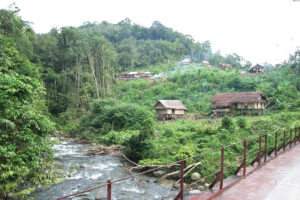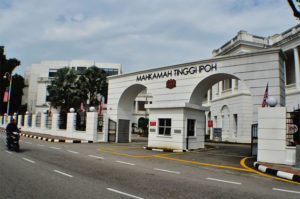A group of Semai residents in Malaysia’s Perak State are continuing a legal struggle against two developers who are seeking to construct a hydroelectric dam on a river in their ancestral territory. A Malaysian news report of November 3 brought the controversy, which has been covered in the news over the last several years, up to date.

According to a report last year, the proposal to build a dam on the Geruntum River in the town of Gopeng, which was first announced in 2012, was immediately opposed by the Semai, who argued that they have customary rights to the land and the river in the area proposed for the dam. They were alarmed by the destructive preparatory work by the developers along the river. The Semai filed a suit in the Perak High Court in the state capital of Ipoh to stop the project.
The latest report about the situation indicates that the Semai are trying to stop any further work on the project by filing requests for injunctions in the court. On October 9, a group of 22 Semai from Ulu Geruntum, in Gopeng, filed an application for an injunction to stop all work on the project until their court suit can be scheduled. Lawyers for the developers replied that they needed time to study the matter. On October 14, G. Bhupinder Singh, the Judicial Commissioner, issued a temporary restraining order preventing the developers from encroaching any further on the lands claimed by the Semai.

On December 15, the High Court will hear the Semai application for an injunction to stop the developers until the entire matter can be resolved. In the meanwhile, according to attorney K. Vinu, the temporary injunction will continue to apply.
The Semai in Ulu Geruntum claim that the preliminary work by the developers destroyed some fruit orchards, about 50 burial grounds, and polluted their source of drinking water. The six villages involved in the issue are Kampung Sungai Kapor, Kampung Sat, Kampung Ulu Kepayang, Kampung Empang Main, Kampung Poh, and Kampung Ulu Geruntum.

In their suit, the Semai seek to have the court declare that they are the legal owners of the land and that the companies lack the right to invade or damage it. They seek a court order requiring the companies to leave immediately and to compensate them for the damages they have already caused. They also are requesting the court to require the state and the national governments to provide compensation.
A date for the full trial on the issues raised by the Semai will be set once the injunction is settled—presumably on Dec. 15. With reports about corporate interests taking precedence over the rights of indigenous peoples in many places, it is heartening to learn that this group of Semai persists in their efforts to obtain justice despite the developers.